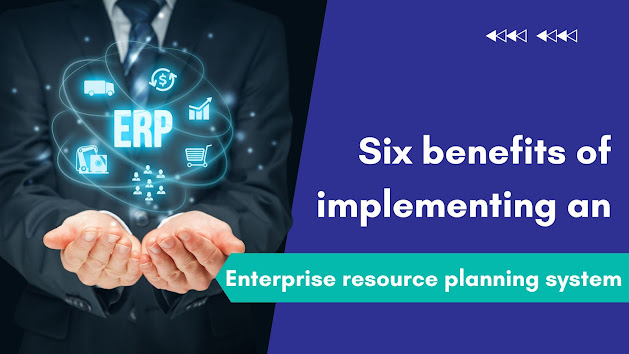Six benefits of implementing an enterprise resource planning system
Enterprise Resource Planning (ERP) systems are designed to help businesses manage and automate their processes, from finance and accounting to procurement and inventory management. By implementing an ERP system, businesses can streamline their operations, reduce costs, and increase efficiency. In this blog post, we'll explore six key benefits of implementing an enterprise resource planning system.
Improved Efficiency
One of the primary benefits of implementing an ERP system is
improved efficiency. With an ERP system in place, businesses can automate a
variety of processes, such as order processing, inventory management, and
financial reporting. This can help to reduce the time and effort required to
complete these tasks, allowing employees to focus on more strategic activities
that drive business growth.
Enhanced Visibility
Enterprise resource management provide
businesses with enhanced visibility into their operations, allowing them to
track performance metrics, identify trends, and make informed decisions. With
real-time data at their fingertips, businesses can quickly identify areas where
improvements can be made and take action to optimize their processes.
Improved Collaboration
ERP systems also enable improved collaboration among team
members, departments, and even with external partners. By centralizing data and
providing access to information across the organization, ERP systems can help
to break down silos and facilitate better communication and collaboration.
Cost Savings
Implementing an ERP system can also help businesses save
money in a variety of ways. By automating processes, businesses can reduce the
need for manual labor, which can lead to cost savings. Additionally, by
streamlining operations, businesses can optimize their supply chain, reduce waste,
and minimize inventory costs.
Scalability
As businesses grow and evolve, they need systems that can
grow and evolve with them. ERP systems are designed to be scalable, meaning
they can be adapted to meet the changing needs of businesses over time. This
scalability ensures that businesses can continue to rely on their enterprise resource
management system to support their operations, no matter how much
they grow.
Better Decision Making
Finally, implementing an ERP system can help businesses make
better decisions. By providing access to real-time data, businesses can make
more informed decisions about their operations, such as when to order more
inventory or when to invest in new equipment. This can help businesses stay
competitive in today's fast-paced business environment.
If you're considering implementing an enterprise resource planning solution for your business, We Are The
Missing Link can help. Our ERP management services are designed to help
businesses implement, manage, and optimize their ERP systems. From system
selection to implementation and ongoing support, we can help businesses get the
most out of their ERP systems and drive business growth.
Conclusion



Comments
Post a Comment